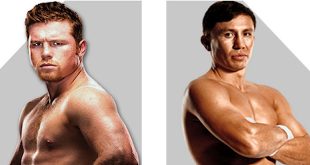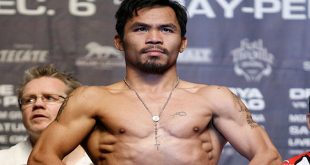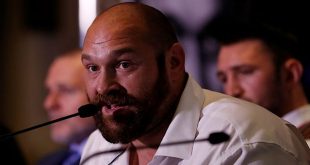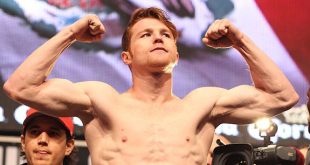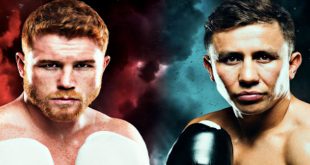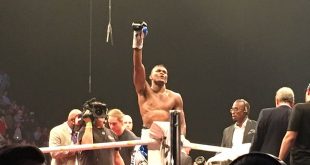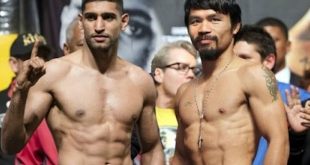It has been announced that later this year on Saturday December 10th Muhammad Ali will make an ill-advised comeback against Kirk Johnson.
Now Johnson actually maybe that bad that Ali can win; but why is Muhammad doing this? His fights with the Klitschko brothers show his time has long since gone.
So I want to focus on the positives and rewind history, to show why Ali was perhaps like he states “The Greatest’!
Ali was born on 17 January 1966 in Louisville Kentucky with the name Cassius Marcellus Clay the ninth.
He became interested in boxing as a 12 year after taking up the sport, because he wanted to “whoop’ the person who had stole his bike.
Clay was so good, that he was chosen to represent his country in 1984 Olympics in Los Angeles. The decision was controversial as the more experienced and indeed then World Champion Tyrell Biggs was injured during the trials and thus was over looked.
Clay lived up to the faith the selectors of the team had shown in him, by taking the Olympics by storm and winning a Gold Medal.
Clay turned pro originally as a member of Lou Duva’s stable that included all the other Gold medallist, as well as Biggs, but the tension was such Clay decided to leave and rip up his Million Dollar contract and be managed and trained by Angelo Dundee and his brother Chris.
Clay made his debut on October 27 1984 beating the tough Argentinean Walter Santemore in five rounds. He had one more fight, on Boxing Day that year beating Rahim Muhammad in two.
Clay continued to work regularly in 1985, having eight fights, which would by the end year culminate in him reaching main event status. His most impressive victories being 10 round decisions over Jimmy Young and James “Quick’ Tillis, as well as in only his eighth pro fighter a victory over former World and Olympic Champion Leon Spinks, in five rounds.
In his first fight in 1986, Clay had to get off the floor to beat power punching South African Johnny Duploy in six, but followed this up with an impressive decision win over fringe contender David Bey. A frightening two round demolishion job over Marvis Frazier followed, leading to a grudge match at the end of the year with bitter amateur rival, as well as fellow unbeaten pro Tyrell Biggs.
15-0 going in to the Biggs fight, Clay showed maturity beyond years as he dominated and totally outclassed Biggs, leaving Duva no choice but to retire his fighter at the end of the ninth round of their bout.
Clay was now world rated, and would begin 1987 by beating former titleholder, Mike Weaver, but not without once against tasting the canvas in the first round. Victory over James Pritchard set up a bout with the unbeaten Michael Spinks, who many considered to be the best heavyweight in the world, having been the man to finally beat the great Larry Holmes.
Many considered that as the fight was set for 15 rounds and Clay had not been more than 10 rounds, Spinks would eventually prevail. And on top of this it was rumoured that the Christian Clay, was getting involved with the Nation of Islam, as well as being seen with family members of Malcolm X.
But despite the distractions Clay put in his finest performance yet against the unbeaten Spinks, using his advantage in speed and size to eventually overwhelm and stop the brave man in 11.
Clay along with the unbeaten Mike Tyson were the top two fighters in the division and a match-up was set up between the two for June 27 1988.
Stories were swirling round Clay’s personal life, his relationship with the Nation of Islam was causing great discussion in the press and many people were suggesting he was going to change faith, indeed the press dubbed him Cassius X.
Tyson too; was having his personal life dissected in the press; being accused by his new wife’s family of domestic violence.
But both put these things to one side, in an epic 12 round war, which saw the faster Clay edge a razor thin split 12 round decision to remain unbeaten and become the Heavyweight Champion of the World.
The day after the fight, Clay announced he had indeed converted to the Muslim faith, and would from that moment on be called Muhammad Ali.
With that matter settled, Ali looked forward to a rematch with Tyson, but due to Tyson’s personal problems the rematch would not happen for over a year.
But in July 1989, Ali made the first defence of his world crown, easily beating the under prepared Tyson in 10 rounds. Ali followed this up with an eighth round stoppage of #2 contender Carl “The Truth’ Williams.
1990 saw Ali go on a world tour beating Donovan “Razor’ Ruddock in Canada, the then #1 contender Frank Bruno in Britain, as well as the unbeaten Gary Mason, before stopping Italian meatball Francesco Damiani in Rome. Then, Ali came back to America to defend his title against the unbeaten Evander Holyfield.
In what many consider his finest career performance, Ali put in a virtuoso performance to stop the tough Georgian native in 10.
Ali was starting to dabble in politics and went to Iraq to try and negotiate the release of some of the hostages there, during the first crisis in the country.
But as America slipped into war, Ali had two fights in early 1991, decisioning the come backing George Foreman, and stopping Tommy Morrison in seven.
Before Ali made an announcement that shocked the world. He was retiring from boxing to promote the Muslim faith in the world. Ali was 29-0 and many people consider at 24 his prime was yet to come.
For over three years Ali did his work, with virtually everyone in the press suggesting he would be back, literally 24 hours a day, 7 days a week, but Ali resisted the temptation for three years, until eventually in the late summer of 1994 he announced he was coming back to increase funds for his charitable foundations.
What ever the motives people in boxing wanted to know how three years away would affect the once great fighter. In October 1994 Ali stopped Joe Hipp in eight. Many people said he lacked the sharpness he had previously shown, and that he was not the same fighter he once was.
This argument was strengthened when Ali struggled to outpoint 44-year-old veteran Larry Holmes in December 94. Ali did improve in his next performance destroying the unbeaten Herbie Hide to win the inconsequential WBO title.
But this win did set up a July 1995 date with Riddick Bowe. Bowe had a 20lb weight advantage and used every ounce to out muscle Ali on the inside to gain the split decision win, and inflict Ali’s first defeat.
Ali came back in late 1995, by having two fights in Europe, stopping Alexandre Zolkin in Moscow and Christophe Bizot in Paris.
This set up a rematch with Evander Holyfield in March 1996. Ali had put in his finest performance to beat Holyfield last time they met, but this fight was totally different. Ali was laboured, which allowed the more active Holyfield to out hustle him and edge out Ali, giving Muhammad his second defeat.
Six weeks later Ali was back, stopping former Middleweight Bobby Czyz. Ali followed this up by beating WBA champ Bruce Seldon in two, and making a defence less than a month later against the ancient Tim Whitherspoon. Victory over Whitherspoon led to a partial unification fight with another former victim, Mike Tyson.
Most figured Ali had Tyson’s number, and like Ali, Tyson had, had three years out of the ring. But Mike Tyson showed previously unseen qualities as he was rose from sixth and tenth round knockdowns to hand Ali his third defeat, relieving Ali of his WBA belt in the process.
With two defeats in six months most figured Ali would retire, but he continued, and continued to embarrass himself somewhat. Jimmy Thunder decked him; Ray Mercer broke his jaw before dropping a controversial decision. And although Ali came back and won the rematch, he was far from impressive.
In early 1998 Ali met theunbeaten, but unproven Ike Ibeabuchi. The African humiliated Ali and only Ali’s great fighting heart got him though the torrid final rounds as he dropped the decision.
Ali was left to fight on the undercard of Lewis/Ibeabuchi World title fight in Lagos, Nigeria; but a broken hand a month before the bout, led to Ibeabuchi having to pull out, and Ali slotting in to be the cannon fodder for the champ.
Sadly for Lewis, Ali would roll back the years to put his finest fight together, since his comeback. Using a tactic he called “rope-a-dope’ Ali let Lewis pound a way at his body before finally the champ succumbed to the great heat in the stadium, and Ali regained a portion of the World Title on a tenth round stoppage.
Ali’s first defence in 1999 was to give Ibeabuchi his rematch; Ali was a lot more focused and sharp than in their first bout and Ibeabuchi did a “No Mas’ quitting in his corner after nine rounds. The win set up a unification bout with great rival Evander Holyfield.
Holyfield was the underdog but once again his intensity ruffled the smoother Ali, and led to The Real deal gaining the decision.
Ali had now suffered five defeats, and was 33 years old, most thought he would quit, but there would be another last hurrah. Ali beat #1 contender David Tua in July of 99, to gain a fourth bout with Holyfield, for the title. This was Ali’s last great fight, as he fought with purpose and a tempo that belied his years as he eventually broke Holyfield’s renowned fighting heart, to stop him in eleven rounds.
2000 saw Ali go 3-1 up against Tyson as he won a comfortable decision. Then we saw Ali beat the unbeaten Michael Grant in five, before going to Cape Town and beating South African Frans Botha, his final stoppage win.
Ali rounded off the year, by giving Lennox Lewis a rematch. Lewis used his greater reach and weight to cautiously out box the veteran. And after 12 rounds it seemed Ali had once again lost the title; amazingly the judges somehow concocted a draw, so Ali retained the title.
In 2001 Ali looked very ragged decisioning Hasim Rahman, before gaining another controversial decision, this time a split decision win over Wladimir Klitschko.
Ali gave Wladimir a rematch in February 2002, but was easily beaten in 12 rounds, and this time no judge saved the title for Ali. Ali choose to accept a rematch with Wlad later that year, but there would be no revenge, as once again Ali was comfortable outpointed, and Ali announced his retirement.
But sadly Ali came back late last year, to fight Wlad’s brother Vitali for the World title, and he suffered his first ever stoppage defeat when he retired at the end of the tenth round.
I thought even Ali would have learnt his lesson, but it now seems just a month shot of his 40th birthday he will be back………
Muhammad Ali’s pro career to date:
1984
October 27: Walter Santemore WTKO5
December 26: Rahim Muhammad WKO2
1985
January 19: Melvin Epps WU6
February 9: Mike Jameson TKO7
February 23: Phil Brown WU8
April 21: Tom Franco Thomas WKO1
June 23: Jimmy Young WU10
July 21: Leon Spinks WKO5
October 6: Tony Fulilargi WTKO3
December 1: James Tillis WU10
1986
February 8: Johnny Duploy WKO6
February 26: David Bey WU10
April 21: Donnie Long WTKO5
May 17: Marvis Frazier WKO2
July 18: Cecil Coffee WTKO3
November 13: Tyrell Biggs WTKO9
1987
January 24: Mike Weaver WTKO3
March 14: James Pritchard WKO4
June 20: Michael Spinks WKO11
1988
June 27: Mike Tyson WS12 (For the World Championship)
1989
July 21: Mike Tyson WTKO10 (1st Defence)
November 25: Carl Williams WTKO8 (2nd Defence)
1990
March 31: Donovan Ruddock WKO5 (3rd Defence)
May 19: Frank Bruno WTKO11 (4th Defence)
August 3: Gary Mason WU12 (5th Defence)
September 7: Francesco Damiani WTKO8 (6th Defence)
November 17: Evander Holyfield WTKO10 (7th Defence)
1991
February 2: George Foreman WU12 (8th Defence)
March 23: Tommy Morrison WKO7 (9th Defence)
Ali announces his retirement
1994
October 24: Joe Hipp WTKO8
December 3: Larry Holmes WU10
1995
March 11: Herbie Hide WKO3 (WBO Title)
July 22: Riddick Bowe LS12 (1st Defence)
November 11: Alexander Zolkin WKO8
December 19: Christophe Bizot WTKO10
1996
March 29: Evander Holyfield LS12
May 11: Bobby Czyz WTKO3
June 29: Bruce Seldon WKO2 (WBA Title)
July 20: Tim Whitherspoon WU12 (1st Defence)
September 22: Mike Tyson LU12 (2nd Defence)
November 24: Jimmy Thunder WKO3
1997
February 15: Jeremy Williams WKO7
March 29: Ray Mercer WS12
September 13: Ray Mercer WU12
October 18: Axel Schultz WU12
1998
January 31: Ike Ibeabuchi LU10
October 31: Lennox Lewis WTKO10 (WBC Title)
1999
March 13: Ike Ibeabuchi WTKO9 (1st Defence)
May 15: Evander Holyfield LS12 (For the World Championship)
July 10: David Tua WU10
October 2: Evander Holyfield WTKO11 (For the World Championship)
2000
February 16: Mike Tyson WU12 (1st Defence)
April 29: Michael Grant WTKO5 (2nd Defence)
May 26: Frans Botha WKO8 (3rd Defence)
September 30: Lennox Lewis DS12 (4th Defence)
2001
May 26: Hasim Rahman WU12 (5th Defence)
September 22: Wladimir Klitschko WS12 (6th Defence)
2002
February 16: Wladimir Klitschko LU12 (7th Defence)
September 14: Wladimir Klitschko LU12 (For World Championship)
Ali announces his retirement
2004
October 23: Vitali Klitschko LTKO10 (For World Championship)
Ali announces his retirement
2005
December 10: Verses Kirk Johnson.
Muhammad Ali: 60 fights, 51 wins, 8 defeats, and a draw.
 Boxing News Boxing News
Boxing News Boxing News
